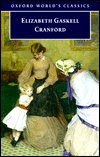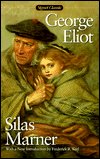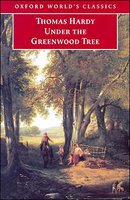 Last week I blogged about favorite books when I was a kid including at least one writer loathed by teachers. That got me thinking about books forced upon me at school that nearlyput me off the authors for life. And in fact I recently re-read one of them, Cranford, and loved it (thanks, Pam Rosenthal, for suggesting it). I was wondering what other books, or authors, others encountered at the wrong time and place, school or elsewhere, and how you’ve come to terms–or not–with them.
Last week I blogged about favorite books when I was a kid including at least one writer loathed by teachers. That got me thinking about books forced upon me at school that nearlyput me off the authors for life. And in fact I recently re-read one of them, Cranford, and loved it (thanks, Pam Rosenthal, for suggesting it). I was wondering what other books, or authors, others encountered at the wrong time and place, school or elsewhere, and how you’ve come to terms–or not–with them.
Cranford by Mrs. Gaskell was chosen by educators for its length, I think. It’s a very short novel, mainly a series of vignettes about life among the spinsters of a small provincial English town in the 1840s. I can’t really find any other reason to inflict it on a bunch of teenage girls who were fantasizing about marrying John, Paul, George, or Ringo. We were totally clueless about what the novel was even about or when it was set. I had the vague impression it was set in America, as there was a reference early on to “the railroad” and not railway–apparently an early Victorian term. I think we’d have responded much better to Wives and Daughters (yes, I’m always going on about Wives and Daughters), which is so romantic (but long), and with a decidely modern outlook on mother-daughter relationships. And then there’s always the hero and his famous knobstick in North and South (which I tried to re-read recently but found heavy going ).
).
Continuing the catalogue of literary disasters, we were also inflicted with Silas Marner by George Eliot. Guess what: it’s short. It’s a very difficult book. It’s particularly tedious if you’re trying to guess the inseam measurement of Mick and the boys. Now I think we would have loved the teenage angst of Mill on the Floss (not my favorite), or Dorothea and her toyboy Ladislaw in Middlemarch. Or even the uberhot Daniel Deronda (though he is fairly boring) and naughty Gwendolyn Harleth.

Sadly, Thomas Hardy was represented by Under the Greenwood Tree. I still have no idea what it was about. I remember a lot of smock-clad yokels pontificating away about life, the universe, and everything, and a scene the teacher (bless her heart) described as being extremely risque, when the heroine appears at an open window with her hair down (the hopeless tart). It’s so sad. To think we could have had the rampant romanticism of Tess of the d’Urbervilles or Far from the Madding Crowd (both made into terrific movies).
Tell us about your near misses!

Oh, the first to pop in my head was Shakespeare. Love the guy now, but back in school, when you’re forced to do it, can’t take your time to understand it, forget it, I wasn’t very thrilled. Part of me was, but maybe 2/3 of me wasn’t. LOL Now, since I took Intro to Shakespeare class, where you can discuss it more, even if you still have those time constraints for papers and tests, it was a lot more exciting. Just does every single class one comes across in life that does at least one Shakespeare play have to do Romeo and Juliet? Geez, must have done that one at least six times in my life or something. But can’t think of any others off hand.
PS — I was wondering when checking the lists I always go to for upcoming Regencies to put on my list to buy, I haven’t seen any Signet Regencies after this month. Did I miss something? 🙁
Lois
Ooh, Janet, I love Cranford! I did my senior seminar in English on it…
Since I’d read every other Austen by the time I was fifteen I decided to try Sense and Sensibility. I read the first chapter every summer, and every summer I would declare S&S the most boring book Austen had written. (I’d even read and liked Emma and Mansfield Park, which have the least liked Austen heroines.) You know the chapter I’m talking about–the one about money and entails and stuff. Finally the summer before the movie came out I forced myself past the first chapter and finished it and adored it! I guess it was just never the right time for me to read it before…
Wow, and the first chapter of S&S has always been my favorite part of that book! (Which is not my favorite Austen.) 🙂
I don’t recall having many books ruined for me in junior high (though I was WAY too young to be reading “Lord of the Flies” or “Black Like Me.”) Well, come to think of it, I read “Wuthering Heights” for school when I was 13 (didn’t quite finish it) and I didn’t really like it. Might have liked it more had I read it first as an adult!
I did get a dose of literature I didn’t much like in high school… Faulkner and Henry James didn’t really do it for me, and I thought Thoreau was in idiot. I did have a teacher or two who over-taught Shakespeare… “Macbeth” is a brilliant, fun play, with gore and witches and melodrama and wonderful stuff that teenagers love… I still loved it, but having to learn about all that cloak imagery and bird imagery DID NOT HELP!!!!!!!
In fact, I think I was still in high school when I developed a theory: symbolism is meant to go from the writer’s subconscious (where it often originates) to the reader’s subconscious. It is not meant to be picked out and analyzed! 🙂 Anyway, that was my theory, and I still largely believe it.
Cara
I had pretty good luck in school, at least in senior English when we were past bores like Fenimore Cooper. We read Tess for our Hardy rather than Silas Marner, Pride and Prejudice, Wuthering Heights, etc. I think the thing that was hardest hit for me was poetry–I’ve always loved poetry, but you’re so right, Cara, that overanalyzing (or insisting that there is a “right” answer to what a poem is “about”, which there isn’t) can ruin it. And I always hated Moby Dick. HATED.
The author I have more appreciation for now is Nathaniel Hawthorne. My junior English teacher made Scarlet Letter the biggest bore ever, and I only now see how modern his themes of alienation and social isolation are. (And that’s my analysis of the day, LOL)
I had to read Thoreau’s Walden in high school, and found it very aggravating. I reread it a few years later and was quite stimulated. I’ve thought since that the book ought to be required reading but that high school is too young — it’s a shame we can’t make 25-year-olds read it in high school. 🙂
I can’t recall any near misses. There was one total miss–Ethan Frome–which I probably won’t open again to see if I like it any better. Too depressing!
Lois,
The sad news is that Signet has ended their traditional Regency line.
We Riskies have known this for a while. We see this blog as a place to share what we love about the Regency, but also as a place to discuss creative risks we take in our writing as we channel these passions into different lines and genres.
Elena
I was thinking Ethan Frome would probably be on someone’s list, even though I loved it, and love almost everything Edith Wharton wrote.
It’s short, which I think is its selling point.
I had good luck with my reading, too, or I ‘m just indiscriminate; I read Wuthering Heights on my own, loved it, read Austen on my own, ditto; I think the only one I almost missed was Hemingway, whom I think is genius now. I got misled by the short sentences and machismo.
Oh, I always liked short sentences. 🙂 Maybe it was because I grew up reading science fiction!
Amanda, my main memories of reading The Scarlet Letter in school are of learning that the red of the flowers right next to the jail echo the red in the cloak, and the meaning of all this imagery is….I forget. I hate imagery! 🙂
BTW, my 11th and 12th grade lit teacher was much better, and let us discuss characters and motivation and stuff like that (though she did make me read Faulkner and James.) 🙂
Cara